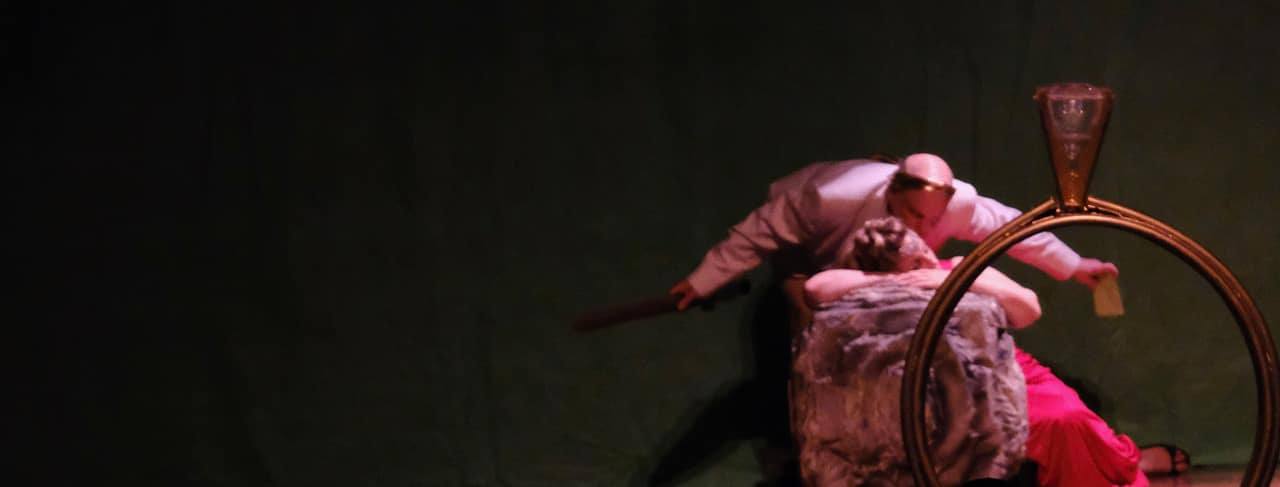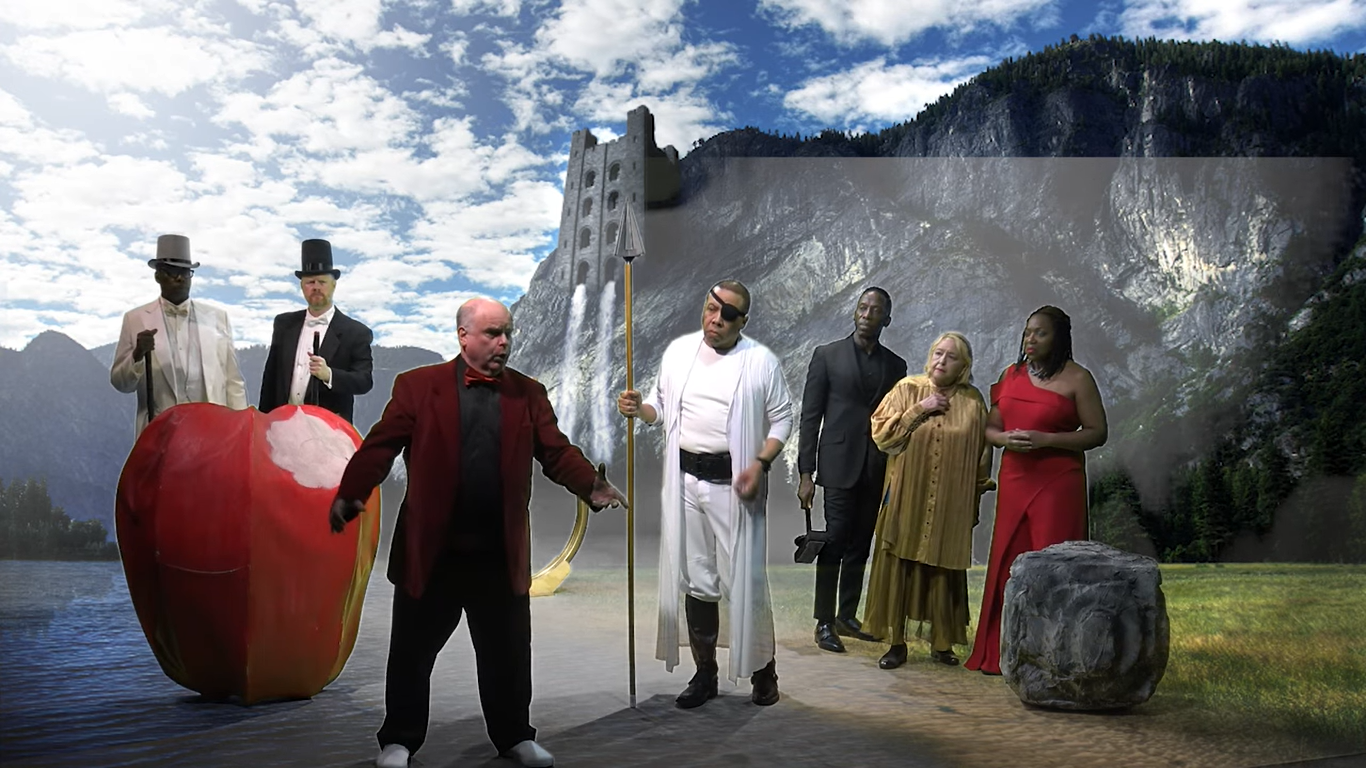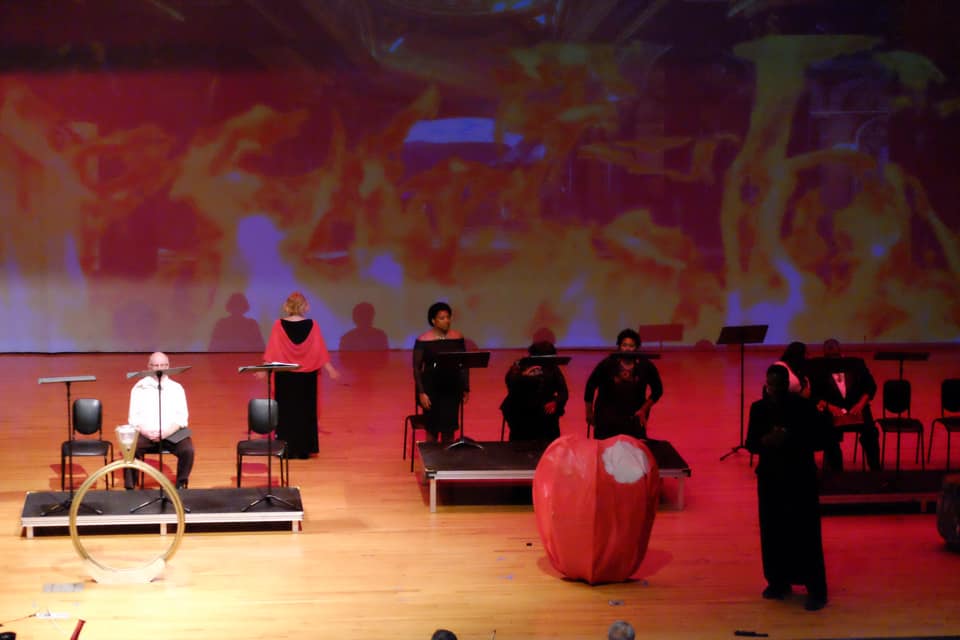Para leer en español, deslizar hacia abajo.
*Note: I used the "Dark Ring" expression to give a title this review, considering the company itself has chosen it to promote their mostly-African American cast Ring production, and with the approval of the director of the company. I hereby intend to avoid any kind of innecesary controversy on ethnics.
Thousands of miles from Germany, Richard Wagner's country, where two productions of his Ring have got global relevance (Bayreuth's disturbing production by Valentin Schwarz, and more recently the Berliner Staatsoper Ring conducted by Christian Thielemann), in the New Jersey State, Trilogy:aoc has reprised their successful (which got Wagnerian's attention worldwide) 2017-2020, adventure and staged the cycle in just one year. Between March and November 2022, Trilogy has brought the mammoth, musical epic to the state for the second time in its history. The cycle starting in March 26 with Rheingold would have finished last month with Götterdämmerung, but due to Covid reasons their Walküre performance scheduled for last May took finally place on November 12.
With this production, Trilogy has introduced Wagner's Ring not only to the Newark audiences, but to the rest of issues of African American community which they usually stage in their repertoire. Of course, they did it in the only possibility available: the reduced version of Graham Vick and Jonathan Dove for small venues. Staged by Maynor himself, each journey of this Ring has been presented in semi-staged version in different theatres, with a green screen set in which fantastic landscapes are projected. The fundamental symbols are reprised for the stage, which according to Maynor, "the Ring represents the struggle, the big red apple represents the source of power behind the once powerful Gods of which the Rhinemaidens cling. The Gold is stage left that caused the fall of so many because of the greed and fight for it".
The musical accompaniment came by the company's orchestra, TAOCarkeste in Rheingold under the Latoya A. Webb, who gave an energic rendition of the score with the limited orchestra, Joseph Jones conducted Walküre, and Leslie B. Dunner conducted Siegfried and Götterdämmerung.
As the Ring has always an inmense cast, with different levels of singing. In Rheingold, we had the privilege to listen Chantelle Grant again as a wonderful Erda, with her dark, velvet-like voice, which made her scene the most magical moment in the show. Fredrick Redd was a good Wotan, as well as both giants, Kevin Maynor as Fafner and Matthew Curran as Fasolt. Maria Marbet reprised her amazing Flosshilde, as well as Pam Jones was a beautifully sung, dramatic-toned Freia. Kevin Courtemanche was a good acted Loge, and sung it well, despite having to confront the orchestra in sound.
For Siegfried, Kevin Courtemanche appeared a bit tired in the title role. On the other hand, Raemond Martin was a superb Wanderer, both acted and sung. Karmesha Peake as Erda was at the same excellent level, with her dark and extremely impressive low notes, being the Erda-Wanderer scene the best in all the show. Again, Pam Jones stole the scene with her charming voice, now as the Forest Bird. Amber Smoke was a Brünnhilde with a big voice, surpassing Siegfried and the orchestra, and also able to enlarge her high notes, like in the awakening scene.
The Götterdämmerung performance, however, was of a great level, maybe the best in all the Wagner performances held by this company. For sure, it is by far the best conducted, with a better balanced orchestra. Leslie Dunner here extracts from the orchestra a wagnerian sound, in which the sense of tragedy, solemnity of this work are noticed in this small orchestra, with the brass and winds having a surprising relevance during the Inmolation, despite some cracks. Here, Kevin Courtemanche is more inspired than in Siegfried, as well as Kevin Maynor whose Hagen is clearly better than his 2020 one, performing an evil but also rude, hick character, with good singing. Again, one of the stars is Chantelle Grant with her beautifully sung, dark-toned, dramatic Waltraute. This mezzo-soprano could make a promising career, as her singing gives her roles all the dramatic intensity and imposing authority they need. Elizabeth Kataria is a Brünnhilde which somewhat reminds me Anne Evans in Barenboim's Bayreuth Ring in the 90s, with an also somewhat youthful tone, despite being light for the tessitura, something noticeable in the high notes. Nevertheless, her big effort and devotion in the Inmolation have closed the Ring with a theatrical sense of Drama. Greg Rahming reprises the role of Gunther, as well as Jonathan Green does with Alberich after last July's Siegfried. There was no chorus, sadly, but at least we could have a great quartet for the remaining cast: Kimberly Lloyd as a sweet Gutrune, and again the accomplished and great singers Geraldine McMillian, Karmesha Peake and Pam Jones as the Rhinemaidens.
Trilogy has done again, specially with this Götterdämmerung, called Goetterdaemerrung in this production, in order to Americanise the spelling. For Newark, so distant from Bayreuth, the main Wagner opera house in the world, and so near to the Met, the main Wagner opera house in the Americas; this chance is definitely part of their cultural history, considering, at a first sight, the unlikely scenario considering the usual themes and the size of this opera troupe.
But Kevin Maynor's will, which proves he is a great Wagnerian, the universality of the Ring's psychological plot , in which he relies, have made it possible, just an hour by transport from the luxury of the Metropolitan Opera House.
Facebook link to listen Act 1 from Götterdämmerung.
Facebook link to watch Act 2 from Götterdämmerung.
Facebook link to watch Act 3 from Götterdämmerung.
ESPAÑOL
El regreso del "Anillo oscuro"*: un Anillo alternativo, a miles de kilómetros de Bayreuth.
*He usado esta expresión, para darle un título a esta crítica, considerando que la propia compañía se ha promocionado así (Dark Ring, en inglés), considerando su reparto de mayoría afroamericana, y contando con el visto bueno del director de la misma. No es mi intención levantar controversia alguna sobre la etnia de la compañía, por un mero tema publicitario que ellos mismos han elegido.
A 6405,36 kilómetros del Festspielhaus de Bayreuth, en Alemania, la patria del maestro Richard Wagner, otro ciclo del Anillo ha tenido lugar en la ciudad de Newark, en el estado de Nueva Jersey, durante el año pasado. Casi a la par que el controversial y perturbador Anillo dirigido por Valentin Schwarz en la colina verde, y el Anillo de Berlín dirigido por Christian Thielemann, los dos más importantes de este año, la compañía Trilogy:aoc, dirigida por el bajo-barítono Kevin Maynor, ha retomado su producción del Anillo wagneriano a cargo de cantantes afroamericanos. Ya entre 2017 y 2020, esta producción captó la atención de los wagnerianos por su singularidad. Este año han pretendido hacer el ciclo entero en una sola temporada, aunque la producción de La Valquiria, inicialmente prevista para mayo, se tuvo que posponer para noviembre.
Con esta producción, Trilogy no lleva solamente el Anillo a la ciudad de Newark, sino a la comunidad afroamericana y a sus vivencias, temáticas del repertorio de esta compañía. Por supuesto, lo hacen en la reducción de Jonathan Dove y Graham Vick, que encaja la obra en pequeños teatros, aunque reduzca su duración a la mitad, lo que no está exento de controversia. En este montaje, una versión de concierto semiescenificada, se usan proyecciones de paisajes, además de los cuatro símbolos fundamentales que siempre están presentes, y que de acuerdo a Maynor, " (...) el anillo representa la lucha, la gran manzana roja representa la fuente de poder detrás de los otrora todopoderosos dioses, y a los que se adhieren las hijas del Rin. El oro está a la izquierda del escenario, causando la caída de muchos por avaricia y por las luchas por obtenerlo".
El acompañamiento musical viene dado por el conjunto TAOCarkeste, dirigido en El Oro del Rin por Latoya A. Webb, y en Sigfrido y el Ocaso por Leslie Dunner. En el Oro, la maestra Webb, posiblemente la primera mujer afroamericana en dirigir el Anillo, por momentos pudo sacar de la pequeña orquesta algo de energía, muy especialmente en la escena cuarta. En La Valquiria, ha sido Joseph Jones quien tomó la batuta. El maestro Leslie B. Dunner ha obtenido el mejor rendimiento de esta orquesta en ambos ciclos. Con una orquesta aquí muy bien sincronizada, Dunner ha conseguido extraer de la misma un sonido wagneriano apreciable, donde se sienten el drama y la solemnidad, muy especialmente en el final, pese a algunos fallos. Con sus limitaciones, este Ocaso ha sido lo mejor de este y de todas las interpretaciones wagnerianas de esta compañía.
Incluso reducido a la mitad, el Anillo tiene que contar con un vasto reparto, y como siempre, los niveles de canto varían, pero se aprecia la devoción y el compromiso del elenco para con la empresa.
Kevin Maynor asume de nuevo varios roles, ahora como Fafner, en Valquiria como un Hunding brutal y un excelente Hagen, cuya voz saca el lado más perverso y bruto del hijo de Alberich. Fredrick Redd fue un solvente Wotan en el Oro, pero ha sido superado de lejos por Raemond Martin, un excelente actor y cantante, como Wotan en Valquiria, y el Viandante en Sigfrido. Otro que asume varios roles es Kevin Courtemanche, un tenor de voz ya madura, pero entregado a la causa pese a sus limitaciones. En el Oro es un intrigante, pragmático Loge. Como Siegmund en Valquiria aparece, sin embargo, un poco agotado pese a que su timbre de voz es agradable y juvenil. Como Sigfrido parece desigual, mucho mejor en el Ocaso, donde interpreta seguro, estable de voz al héroe, dejando una aseada interpretación de su muerte. Maria Russo, entregada en su ultima escena en Valquiria, Amber Smoke, de potentísima voz en Sigfrido, y Elizabeth Kataria interpretan a Brunilda, esta última en el Ocaso, recordandome a veces a Anne Evans en el Anillo de Barenboim. Voz en apariencia ligera, de sonido juvenil aunque nasal. No obstante, Kataria se entrega en la Inmolación. Daniela Davis fue una Sieglinde de voz dulce y generosa de volumen, aunque con algún problema en el agudo
Un placer es contar de nuevo con la espléndida mezzosoprano Chantelle Grant, quizá la mejor del elenco, con su voz de oscuro timbre, bien proyectada y con sentido del drama, además de graves apreciables, como en su gran Waltraute, o siendo su breve intervención como Erda lo mejor del Oro. En Sigfrido fue Karmesha Peake quien interpretó a la sabia diosa de la tierra, estando a la altura de Grant, con su carnosa voz, y sus potentes graves, siendo el dúo como el viandante de Martin, lo mejor de ese Sigfrido. Alison Gish ha sido una de las sorpresas de esta compañía al interpretar una Fricka de voz aterciopelada, bello timbre y muy bien cantada. Pam Jones es una soprano de voz deliciosa, interpretando los roles de Freia, muy bien cantada, el Pajarillo del bosque y una de las hijas del Rin.
Trilogy lo ha vuelto a hacer. El llevar a Newark este ciclo, a miles de kilómetros de distancia de Bayreuth, y a una hora del Met, ambos los teatros wagnerianos más importantes del mundo, supone un acontecimiento histórico para la vida cultural del Estado de Nueva Jersey. En un escenario improbable, la voluntad y la determinación de Kevin Maynor, lo que le confirma como un gran wagneriano, y la universalidad del Anillo, en la que él confía, lo han hecho posible.
Enlace para ver El Oro del Rin
Enlace al Facebook de la Compañía para escuchar el primer acto del Ocaso.
Enlace al Facebook de la compañía para ver el Acto segundo de El ocaso.
Enlace al Facebook de la compañía para ver el tercer acto del Ocaso.
Las fotografías no son de mi autoría, si alguien se muestra disconforme con la publicación de cualquiera de ellas en este blog le pido que me lo haga saber inmediatamente. Cualquier reproducción de este texto necesita mi permiso.








No hay comentarios:
Publicar un comentario